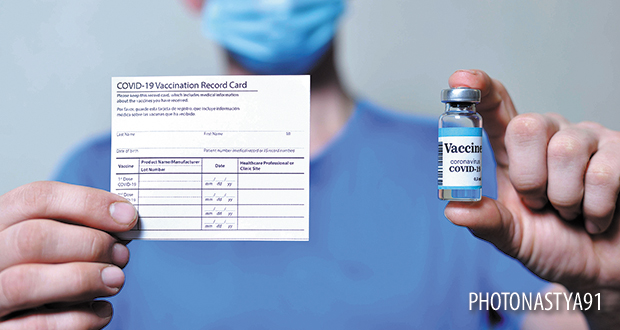
As more companies bring employees back to the office in-person, they are evaluating when they can tell supervisors about employees’ vaccination status and whether workers can be required to wear a badge that says they’ve been vaccinated.
According to the Equal Employment Opportunity Commission (EEOC), vaccination information is considered confidential medical information. Such information may only be disclosed if someone “needs to know” it.
While a supervisor may legally ask an employee’s vaccination status, it’s generally best to leave questioning of employees on the topic to the HR department.
Here are some situations when a supervisor might need to know an employee’s vaccination status:
- Mask policy: If the company has a policy that says fully vaccinated employees don’t have to wear masks, a supervisor might need to know an employee’s vaccination status to fairly enforce that rule.
- COVID-19 exposures: In a company where a COVID-19 exposure arises, employees’ vaccination status might be relevant.
- Vaccines mandated: If a COVID-19 vaccination is mandatory in the workplace, and an employee is not vaccinated due to an accommodation, their supervisor would need to be informed.
Supervisors must be trained to protect information about an employee’s vaccination status. That’s because conversations on the topic could delve into disability-related information or protected medical information. As a result, supervisors may not ask a worker:
- Whether they plan to get vaccinated in the future.
- Why they didn’t get vaccinated — or why they did.
Can employees be required to wear ‘vaccine badges’?
Given the EEOC rules, it is generally agreed that vaccine badges can’t be mandated. What remains unclear is whether employers could allow employees to wear such a badge if they so choose.
One concern in implementing such a policy is workers feeling pressured to share their vaccination status, possibly causing conflict between vaccinated and unvaccinated workers.
Assuming it’s consistent with company policy, nothing bars employees from voluntarily disclosing their vaccination status.
A company might also consider providing an optional badge or wristband to indicate that a worker is allowed to be at the office without a mask. In Massachusetts and some other states that would indirectly indicate who is and isn’t vaccinated. In such a case, most of the people with the badge or wrist band would be vaccinated. It is also possible that some would be allowed to go maskless due to a reasonable accommodation.
Many companies are skipping badges altogether. Others are creating and disseminating policies that define rules for face coverings and requiring employees to sign, confirming that they understand the rules and any repercussions for violating them.
 New England Biz Law Update
New England Biz Law Update
